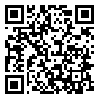Volume 1, Issue 4 (3-2015)
Human Information Interaction 2015, 1(4): 270-281 |
Back to browse issues page
Download citation:
BibTeX | RIS | EndNote | Medlars | ProCite | Reference Manager | RefWorks
Send citation to:



BibTeX | RIS | EndNote | Medlars | ProCite | Reference Manager | RefWorks
Send citation to:
Nasrollahzadeh S. Health Information-Seeking Behavior of Pregnant Women: A Grounded Theory Study. Human Information Interaction 2015; 1 (4)
URL: http://hii.khu.ac.ir/article-1-2411-en.html
URL: http://hii.khu.ac.ir/article-1-2411-en.html
Librarian of Shahidan Moradi Public Library, Shirgah, Savadkooh Shomali, Mazandaran, Iran
Abstract: (48677 Views)
Background and Aim: In studies of special groups’ information seeking behavior, there is not a complete understanding of pregnant women's information seeking process. The purpose is to gain a deeper understanding of health information seeking behavior of the pregnant women.
Method: This is an applied qualitative method using Grounded Theory approach. Data were collected through semi- structured interviews with 15 pregnant women who were selected from 5 women's hospitals in Tehran. Data was analyzed using three stages of: Open axial and selective coding- used in Grounded theory approach- and a model of pregnant women’s health information seeking behavior was extracted.
Results: five conceptual categories: information seeking motives, barriers, information seeking, information evaluation, and information sharing were the results of three stages of coding, expanded around the main idea of “pregnant women’s health information seeking behavior” to establish a model for this process. Based on the findings, pregnant women's most essential information needs were psychological needs, nutrition, health of mother and fetus, and the ways of childbirth. The most important information seeking barriers were lack of time for searching information, lack of ability in information evaluation, and the high level of difficulty of the books. Physicians were the first and the most important reference in information acquisition and important criteria for information evaluation.
Conclusion: Findings reveal the importance of information acquisition in pregnant women, effective intervention of information professionals in meeting information needs, removal of information seeking barriers, facilitating information seeking process and more attention to information centers seems necessary. Also, results could be applicable to various organizations for women’s health.
Method: This is an applied qualitative method using Grounded Theory approach. Data were collected through semi- structured interviews with 15 pregnant women who were selected from 5 women's hospitals in Tehran. Data was analyzed using three stages of: Open axial and selective coding- used in Grounded theory approach- and a model of pregnant women’s health information seeking behavior was extracted.
Results: five conceptual categories: information seeking motives, barriers, information seeking, information evaluation, and information sharing were the results of three stages of coding, expanded around the main idea of “pregnant women’s health information seeking behavior” to establish a model for this process. Based on the findings, pregnant women's most essential information needs were psychological needs, nutrition, health of mother and fetus, and the ways of childbirth. The most important information seeking barriers were lack of time for searching information, lack of ability in information evaluation, and the high level of difficulty of the books. Physicians were the first and the most important reference in information acquisition and important criteria for information evaluation.
Conclusion: Findings reveal the importance of information acquisition in pregnant women, effective intervention of information professionals in meeting information needs, removal of information seeking barriers, facilitating information seeking process and more attention to information centers seems necessary. Also, results could be applicable to various organizations for women’s health.
Type of Study: Research |
Send email to the article author
| Rights and permissions | |
 | This work is licensed under a Creative Commons Attribution-NonCommercial 4.0 International License. |






